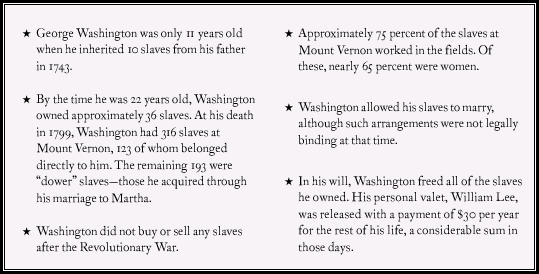 |


|
 |


Throughout the coming months The Patriot Papers will address the issue of slavery during George Washington's time. In view of Washington's many attributes and accomplishments, it is difficult to acknowledge his role as slave owner. Guest historians will share their perspectives; we invite you to share yours. Hopefully, through dialogue, we will increase our understanding.
-F. A. Pulles, editor
PatriotPapers@npg.si.edu
 |

|
RUNAWAY SLAVE. Mrs. Washington
is greatly distressed by the loss of Olney Judge, her Mount Vernon servant so
skilled in needlework. The girl, we hear, was lured away by a Frenchman who tired
of her and left her stranded in Portsmouth, New Hampshire. President Washington
has sent word that all will be forgiven if she returns to her mistress, but she
has refused to come back unless promised her freedom. This puts the President
in an awkward situation. Privately he has said that although he is sympathetic
to her demand, setting her free would only reward her for running away and would
spread discontent among the rest of his servants (as he calls them), who by being
faithful are more deserving of their freedom than the runaway. Above all, the
President cautioned that no violent means should be used to bring her back, lest
a mob or riot be excited.
Rather than risk this happening, he would tell Mrs. Washington she must get along
without the services of Olney Judge.
FREEDOM TOO GREAT A TEMPTATION.
President Washington has brought a handful of servants from Mount Vernon, but
he will be faced with the difficulty of complying with the Pennsylvania law freeing
adult slaves who have lived in Pennsylvania for six months in a row. It is believed
that the President, therefore, will have to shuttle these servants back and forth
and suffer the inconvenience of sometimes being without his cook, Hercules. Asked
if he feared his slaves might take advantage of being in the North to run away,
the President has privately conceded that “the idea of freedom might be
too great a temptation for them to resist.”
Today, most of us own many more
things than we really need to live on. When George was 11 years old, his family
made an inventory (or list) of their possessions. Here is what they owned, besides
their land:
• 16 pairs of sheets
• 17 pillowcases
• 13 beds
• A couch
• Desks
• Chairs
• A fireplace set
• Tablecloths
• Napkins
• A looking glass (mirror)
• One silver-plated soup spoon
• 18 small spoons
• 7 teaspoons
• A watch
• A sword
• 11 china plates
• 20 slaves
How many of these same items are owned by your family today? Are you surprised
to see “slaves” listed as part of the inventory of possessions? If
you were to make an inventory of every item in your home, how long do you think
the list would be? How many items would be unfamiliar to George Washington?
PRESIDENTIAL RESIDENCE, 190 HIGH STREET, PHILADELPHIA.
Additions will be made to accommodate Mrs. Washington and her two grandchildren,
Nelly, who is about twelve, and George Washington, who is about ten, as well as
the President’s secretary and numerous servants.
|





